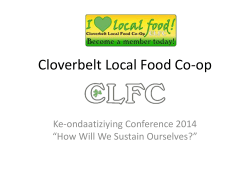
Why it failed? A case study in Turkish organic stock
Why it failed? A case study in Turkish organic stock-raising Beyza Obai Archived at http://orgprints.org/24272 Few years ago a farmer who usually sells his products in the organic bazaar of İstanbul, Feriköy had to face a business challenge; should he raise organic animals as well? When he shared his ideas with his regular customers they were interested and even excited with the idea. Government was providing financial support for this industry and for the customers, idea was interesting because they would have access to the dairy products which at that time were not easily found in the regular shops. The idea was good but it did not work; for some time customers (although very few) gave support; they provided partial resources for buying the animals, later for food but in the long run having fresh organic milk, cheese and yogurt turned out to be an expensive adventure for them. The farmer, for some time carried the business by his own means and the support provided by the government authorities but gradually he had to give up as well. This failure case focuses on the story of the farmer and customers. Although it is a failure case we can enhance our understanding about the organic stock-raising in Turkey. Usually studying failure cases provides more fine grained information about the issue under study and furthermore, the investigation of reasons behind failure can provide guidelines for policy makers and other stakeholders to minimize such incidences. So this paper by focusing on other failure cases as well tries to provide a deeper understanding for developing organic stock-raising industry in Turkey so that small producers can take part in the market. The problem According to Organic Product Producers and Industrialists Association (ORGUDER) demand for organic meat and dairy products is increasing (Dünya Gazetesi, 2012). Although we do not have definite numbers all available data sources claim that there an increasing domestic demand for organic meat. This increase in demand is mainly related to two issues; conventionally grown livestock imports and media coverage on illegal, unhealthy conditions for raising and processing conventional meat. Since organic meat is more expensive than the conventional one consumer are usually from the upper socio-economic class. On the supply side we have more data and recently as indicated by the same source there are about 137 meat producers in Turkey. However, a deeper analysis reveals that meat production is 1 concentrated in specific regions-mainly Marmara, Aegean, East - and among this 137 producers only a few are big producers. Table 1: Trends in organic meat production Years No. of producers No. of animals 2005 6 12,019 2006 12 13,402 2007 27 21,208 2008 37 16,758 2009 150 23,581 2010 174 58,886 2011 225 45,981 Source: Ministry of food, agriculture and livestock, National Action Plan, 2013 There is substantial support by the government; subsidies, credit and provision of an institutional environment in terms of establishing certification organizations and information on organic agriculture. Similarly, an association, ORGUDER, tries to support organic producers with knowledge, information exchange and publicity. Antecedents of the problem Thus, we can say that conditions are sufficient to promote organic meat production but still small producers have problems and failure probability for these producers is fairly high. A quick analysis of the industry, as outlined below will clarify this problem further: Nature of product; unless it is frozen and preserved in cold rooms meat has to be consumed in a short period of time otherwise it will be spoiled. Because of this very nature of the product either it has to be consumed locally or investment in freezing systems is needed. This requires financial resources to be invested in freezing and transportation. Quality of the product; organic meat production develops with the organic agriculture. In order to be certified as organic, animals have to be fed with organic food and graze in organic fields (www.gidateknolojisi.com.tr). As organic food for cattle is expensive, input costs for the industry is high. And since small producers have less bargaining power as compared to bigger ones it is inevitable that they have higher costs. 2 Nature of the industry: as indicated before industry is dominated by few big producers which give them better opportunities in terms of low input costs, market power in determining prices and better access to other stakeholders. Nature of relations; in concentrated industries the relations between big and small producers is usually adversarial and this applies to this industry as well. Big producers, in order not to lose their dominant position and market power are not willing to cooperate with the small producers. This situation, in future will lead to more concentration in the industry. However, small producers are closer to the consumer and have more fine grained information about trends in the demand. Small producers have problems related to size as well; Shortage of financial resources; banks are not reluctant to give credit to no name and no experience firms, investors have similar attitude. Lack know-how in doing business; applying for government funds, dealing with certification organizations, fund raising, marketing etc. In other words they are only producers but not business people. Provision of these functions deems extra financial resources which they are already short of. Policy recommendation One best proven way to overcome these problems in other economies is industrial clusters; in clusters producer deals only with production and other business functions like finance, marketing are carried by the cluster management for all the participants. Even with branding instead of each producer branding their own products a brand for the cluster products is developed. In this way, small producers can focus on production in which they have competency. References Dünya Gazetesi, 3, 8, 2012 Gıda Teknolojisi; www.gidateknolojisi.com.tr Ministry of food, agriculture and livestock, National Action Plan, 2013 i İstanbul Bilgi university Department of Business Administration e-mail: beyza.oba@bilgi.edu.tr 3
© Copyright 2025









